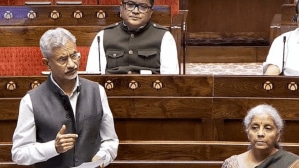Punjab implements land pooling policy: ‘100% voluntary, up to 400% return on investment’
Finance Minister Cheema said the policy was a decisive blow against the land mafia and the era of illegal colonies and forcible land acquisitions.
 Finance Minister Harpal Singh Cheema further criticised the opposition parties for shedding "crocodile tears" and attempts to "mislead" the general public against AAP government's efforts. (PTI)
Finance Minister Harpal Singh Cheema further criticised the opposition parties for shedding "crocodile tears" and attempts to "mislead" the general public against AAP government's efforts. (PTI)The Punjab government Thursday announced the implementation of its land pooling policy, with “100 per cent voluntary participation” as its core principle while claiming that farmers stand to gain up to a 400 per cent return on their land investment. The policy is designed to foster transparent and planned urban development across the state, Finance Minister Harpal Singh Cheema said.
“The policy marks a significant departure from past practices, prioritising voluntary participation and empowering landowners to become active stakeholders in the state’s progress. The policy’s core principle is 100 per cent voluntary participation. There will be no forcible land acquisition. We developed a model that respects the rights and aspirations of our farmers and landowners,” said Cheema.
The implementation of the policy comes at a time Opposition parties have opened a front against the AAP government’s proposal to acquire 24,311 acres of land in Ludhiana for developing new urban estates.
Cheema said landowners participating in the pooling policy would benefit economically. “It directly addresses the growing demand for affordable housing in our urban centres, driven by Punjab’s rapid urbanisation. Market estimates indicate that farmers who engage in this policy stand to gain up to a 400 per cent return on their land investment,” he said.
Agencies of the state government would undertake development of pooled land, ensuring the provision of modern infrastructure, including roads, water supply, sewerage, drainage, and electricity, he said. “Once developed, the land, returned to the original landowners as per their contribution, will appreciate significantly. Landowners will have the autonomy to utilise their developed land as they see fit, whether for personal use or for sale,” the minister said.
Cheema said the policy was a decisive blow against the land mafia and the era of illegal colonies and forcible land acquisitions. “For the past three decades, the Congress, Akali-BJP governments have operated in collusion with the land mafia, enriching their political allies at the expense of our farmers. This policy puts an end to that corrupt system,” he alleged.
He further criticised the opposition parties for shedding “crocodile tears” and attempts to “mislead” the general public against AAP government’s efforts to “revolutionise” urban development and “empower landowners” in Punjab.
“Their outrage is an attempt to protect their crony land mafia. During their tenures, countless acres of land were forcibly seized from farmers and subsequently sold to developers and builders for exorbitant profits. They are terrified that the AAP government’s plan to extend this land pooling policy to all major cities in Punjab, ensuring affordable and world-class housing, will dismantle their lucrative network of corruption,” he alleged.
He termed the policy “a testament” to the AAP government’s “dedication to transparent governance and equitable development”. “We are building a Punjab where prosperity is shared by all, and the exploitation of our farmers and working-class citizens is a thing of the past,” he added.
Detailing how it will benefit the landowners, Cheema said that, if the market rate of one acre of land is Rs 1.25 crore, then under the old policy, it would be acquired for Rs 1.2 crore, calculated by multiplying the collector rate of Rs 30 lakh by a factor of two (for rural areas) and adding a 100% solarium.
In contrast, under the new land pooling policy, the landowner would receive a developed residential area of 1,000 square yards and a commercial area of 200 square yards in exchange for contributing one acre of land. Assuming a price of Rs 30,000 per square yard for residential areas and Rs 60,000 per square yard for commercial areas, the total value the landowner would receive would be approximately Rs 4.2 crore (1000 sq yds x Rs 30,000 + 200 sq yds x Rs 60,000). This highlights the significant benefits offered by the land pooling policy, said Cheema.












